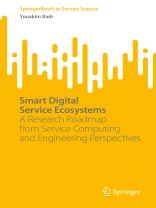This book provides a holistic overview of the major advances that have been made in the context of Service Science with a focus on IT-enabled services. To address challenges in collaborative, social-centric, ad-hoc, dynamic and open environments, the book studies IT-enabled service systems from two distinct but complementary research perspectives: service engineering and service computing. From a service engineering view, the book shows how to apply a systemic approach to tackle social problems from holistic and multi-disciplinary perspectives by focusing on service systems and developing a service design framework, including socio-technical aspects, the service reference model, data-driven collaboration processes, the incremental design method, requirement propagation, and system adaptability with feedback loops. From a service computing view, the book introduces a service-oriented aided infrastructure to support IT-enabled service systems in ICT-facilitated environments and provide access to tangible and intangible resources in a trustworthy environment.
The book offers a valuable companion and comprehensive reference guide for undergraduate and graduate students who want to learn about current concepts for designing and implementing service systems; and for researchers who want to identify future directions in build smart digital service ecosystems, integrating Internet of Things (Io T) and Artificial Intelligence (AI) and cyber-security. The book also appeals to developers who need to implement advanced services and want to capitalize on corresponding business models, customer-driven interaction, and scalable architectures.
Circa l’autore
Dr. Youakim Badr is Full Professor of Data Analytics at the Pennsylvania State University – Great Valley, and professor-in-charge of the professional master of studies in Artificial Intelligence. He received his Master of Science degree in “Mathematical Modeling and Scientific Software Engineering” from the Francophone University Agency in 1997. He earned his Ph.D. in computer science from the French National Institute of Applied Sciences (INSA-Lyon) in 2003, and the Habilitation degree (“Habilitation à diriger des recherches, ” the higher doctorate in France) from the University of Lyon in 2013.
Over the course of his research, Dr. Badr has worked extensively in the area of service computing (distributed systems, interoperable and reusable software components) and information security to design and deploy self-adaptable connected devices and build secure “service-oriented systems” for the Internet of Things (Io T). In addition, Dr. Badr conducted research activities on the integration of data analytic capabilities and service computing to make service systems smarter from the flood of data generated by connected devices.
Dr. Badr’s current research strategy aims at designing and deploying “Trustworthy AI service systems.” He investigates research challenges and business problems from a multidisciplinary and systemic perspective, focusing on AI analytics systems, Trustworthy AI systems and Composable AI systems.












